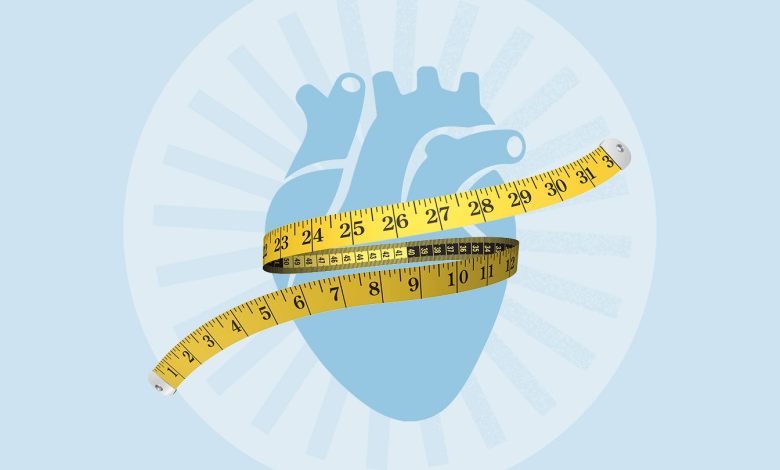Weight Cycling Increases the Risk of Heart Attack and Stroke

[ad_1]
“Our findings indicate that on a population level, individuals with greater variability in BMI [body mass index] are at higher risk for adverse cardiovascular events as compared to others with less BMI variability,” says a coauthor of the study, Zakaria Almuwaqqat, MD, MPH, a hospital medicine doctor and postdoctoral fellow in cardiovascular disease at Emory Healthcare in Atlanta.
As Many as Half of Americans Are Weight Cycling
The Higher the Amount of Weight Lost and Gained, the Greater the Heart Risk
The study used data from two large cohorts, the Million Veteran Program of more than 92,000 U.S. veterans, and 65,000 people from the UK Biobank.
The veteran group had an average age of 57, and 88 percent were men. Ten percent were Hispanic, 24 percent were Black, and 65 percent were white. The average BMI was 30, and BMI measurements were taken multiple times over an average of 10 years. At least three measurements were needed for an individual to be included in the study.
The UK group also had an average age of 57, and 41.5 percent were men. All the subjects were white, and the average BMI was 27 — significantly less than the veteran group average.
Weight cycling was measured by averaging the BMI measurements over the course of the study. For example, if one subject had three different BMI measurements of 30, 31, and 32, the average would be 31 and the standard deviation would be 1.
Participants were followed for about four years. During that time, researchers tracked the number of heart attacks, strokes, and deaths due to heart disease.
The researchers found that weight cycling was associated with an increased risk of negative cardiovascular events in all racial and ethnic groups. In the veteran cohort, each 1 standard deviation increase in BMI variability was associated with a 16 percent higher risk of cardiovascular events, which included nonfatal heart attack, stroke, and deaths from heart disease.
In the UK Biobank cohort, each 1 standard deviation increase in BMI variability was associated with an 8 percent higher risk of cardiovascular death.
“We have found that the greater change in BMI correlates with a higher risk of adverse cardiovascular events in a dose-dependent manner,” says Dr. Almuwaqqat.
Because the study used each subject’s individual weight to calculate the standard deviation, it is difficult to pinpoint the exact amount of weight fluctuation that is considered high risk, since it is very patient specific, says Nishant Shah, MD, a cardiologist at Duke Health in Durham, North Carolina, who was not involved in the study.
“Instead, consider rapid shifts over a course of time — for example, down 20 pounds from baseline and then up 20 pounds from baseline over a six month period — to be of more cardiovascular risk than a sustained 20 pound weight loss, according to the study results,” he says.
Risk of Weight Cycling Influenced by Race and Ethnicity
Investigators also found that the associated risk was different depending on race and ethnicity. The association between weight cycling and stroke was stronger in Black participants, and the link between weight cycling and cardiovascular death was higher in white subjects. Because the association wasn’t as strong in the UK group, the risks could be influenced by race or sex, the authors noted.
Weight Cycling May Add Extra Stress to the Heart
It’s unclear exactly why weight cycling may increase the risk of heart disease, says Dr. Shah. “There are many hypotheses. For instance, the rapid changes in body weight can add extra stress to the heart, may lead to vascular dysfunction, or lead to more inflammatory fatty tissue development,” he says.
It’s also possible that rapid changes in weight could be caused by other medical conditions like cancers, infections, or inflammatory disorders, which could add further stress if a person already has an underlying heart condition, says Shah.
Striving for a Healthy Weight Still Has Health Benefits
The findings here don’t mean that people should abandon all efforts to achieve their healthy weight, says Shah. “There are plenty of benefits of weight loss, and people should still strive to find ways they can successfully have sustainable weight loss,” he says.
Obesity can lead to several serious comorbidities, including high blood pressure, high cholesterol, and type 2 diabetes, that can worsen your overall heart disease risk, he points out.
“It is also very difficult to make many conclusions based on one study alone. We need more data to better understand the magnitude of BMI variability that is most concerning,” he says.
It’s also worth noting that a much higher proportion of males than females participated in the veterans’ cohort, and there may have been other risks or contributing factors that the researchers didn’t account for that could have led to the findings, says Shah.
Should These Findings Concern People if They Are Taking GLP-1 Off and On?
This study didn’t look at people on GLP-1s. The participants had BMI changes that were not caused by medications, and so this question can’t be answered from this data, says Almuwaqqat.
“The use of GLP-1 is generally associated with cardiovascular risk reduction, and the impact of weight fluctuations is not clear among these individuals,” he says.
GLP-1 medications have several benefits when they are prescribed and taken appropriately, says Shah. “At the end of the day it is a benefit-to-risk evaluation that is very specific to the patient. Patients should discuss with their healthcare provider about what is right for them,” he says.
[ad_2]




